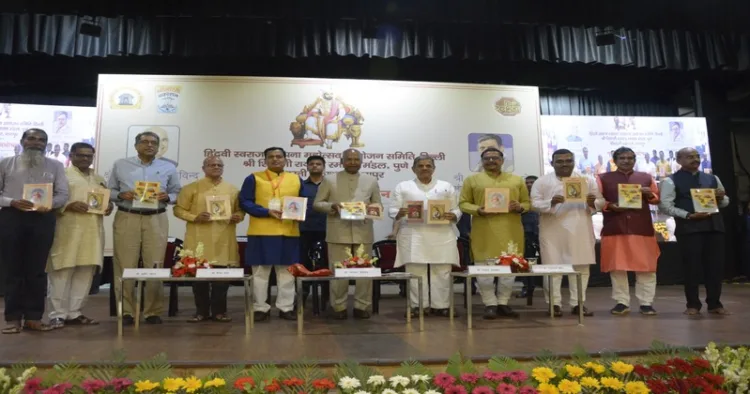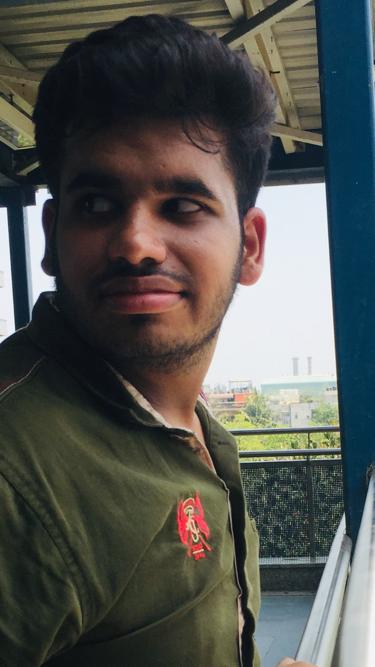“Chhatrapati Shivaji Maharaj never spoke of Maratha Samrajya but always promoted the idea of Hindavi Swaraj. Shivaji’s vision led to the Marathas raising the saffron flag from Attock to Cuttack, enhancing the glory of Bharatiya culture”, said RSS Sarkaryavah Dattatreya Hosabale in a book release function on Chhatrapati Shivaji Maharaj. Organised under the aegis of the Hindavi Swaraj Sthapana Mahotsav Aayojan Samiti; Shri Shivaji Raigad Smarak Mandal, Pune and Shri Bharti Prakashan, Nagpur, the event saw the release of four significant books. These books illuminate various facets of Chhatrapati Shivaji Maharaj and the Maratha Empire, highlighting how Shivaji organised Hindu society and ignited the spirit of Swarajya. It showcases Shivaji’s bravery in expelling the Mughals and establishing Hindavi Swaraj.
The event was graced by former President Ram Nath Kovind as the chief guest and RSS Sarkaryavah Dattatreya Hosabale as the keynote speaker. The books released were the transcription in English and Hindi of four books originally published in Marathi. These books are: Chhatrapati Shivaji Maharaj (Hindavi Swaraj: Shivaji Ki Akhil Bharatiya Sankalpana, Mughalon Se Muqabla Aur Unke Patan Ki Kahani) by Dr Kedar Phalke, Swaraj Sanrakshan Ka Sangharsh (Bharatvarsh Ka Punarjagaran Evam Safalta Ki Kahani) by Pandurang Balkavde, Sudhir Thorat, and Mohan Shety, Atharhavi Shatabdi Ka Hindavi Samrajya (Hindavi Swaraj Se Samrajya: Safalta Ki Kahani) by Pandurang Balkavde and Sudhir Thorat, Chhatrapati Shivaji Na Hote To… by Gajanan Mahendale. Shri Shivaji Raigad Smarak Mandal also plans to release these book in more than 20 regional languages.
In his keynote address, Dattatreya Hosabale said, “Chhatrapati Shivaji fostered a sense of national pride through his actions and established Hindavi Swaraj by defeating the Mughals in his time. During his lifetime, he had already become a legend, which reflects his esteemed reputation”.
Dattatreya Hosabale stated that “For future generations, if a person instils the thought that one should live for the country and, if necessary give sacrifice for it, then such a person is Chiranjeevi (eternal). In this regard, Shivaji is Chiranjeevi.”
Sharing an anecdote, Dattatreya Hosabale recounted that after the Vietnam War, an official was asked how they managed to fight a powerful country like America for years without being captured and eventually defeated. The official responded, “I am a warrior of Shivaji.” This example has been cited in many historical books”.
“Learning from history is a task that many countries around the world undertake. In Britain, Jews living there take their community members studying there to Jerusalem, Israel to inspire them and let them know their history. The people of France and China tell true history to their people. But in Bharat, the history of Chhatrapati Shivaji was distorted more by the people living in independent Bharat than the British during the colonial rule. But Shivaji became part of the folklore and these distortions cannot erase him from the collective memory,” he added.
“Even though attempts have been made to distort Bharat’s glorious history, no one has been able to erase the illustrious history of Chhatrapati Shivaji Maharaj from the hearts of the Bharatiyas ,” he said.
He further emphasised that Chhatrapati Shivaji Maharaj never spoke of Maratha Samrajya but always promoted the idea of Hindavi Swaraj. Shivaji’s vision led to the Marathas raising the saffron flag from Attock to Cuttack, enhancing the glory of Bharatiya culture. He also called for similar events across the country to spread the good governance model of Hindavi Swaraj.
Sharing another anecdote, he said, “During Swami Vivekananda’s travels across Bharat, when he was reciting some patriotic lines in praise of Shivaji Maharaj, a person named Nag Mahashay from Bengal asked whom he was speaking about. When Vivekananda replied that he is reciting about Shivaji Maharaj, Nag Mahashay remarked that he was a looter (because a British historian had written). This angered Vivekananda, who then gave a 1.5-hour lecture on Shivaji’s bravery. This has also been mentioned in Gajanan Mahendale’s book, stating that if Shivaji was not there, the situation of Bharat would have been more dire”.
Recalling Yashvantrao Chavan’s talk with Pt Nehru, Hosabale said, “On January 26, 1961, a statue of Shivaji Maharaj was installed in Mumbai. At that time, Yashwantrao Chavan was the Chief Minister of Maharashtra, who later became the Defence Minister, told Pandit Nehru that if there was no Shivaji, we wouldn’t have gone far to see Pakistan’s border; it would be right at our doorstep”.
“Shivaji never aspired to become a king for himself. He had no desire to sit on the throne but instead wanted to convey a message at a time when the Bharatiya society’s mindset was defeated, people had lost their temples, their culture was being destroyed, and their religion was under threat. Chhatrapati Shivaji’s message was that Bharatiya society is brave and alive, and the Hindu community is powerful, it will rise, and it will eventually govern its own samrajya. Hosabale further highlighted that Shivaji had paid attention to things such as agriculture policy, industry, international trade and shipbuilding to revive the Bharatiya society.
Former President Ram Nath Kovind, who was Chief Guest, described Chhatrapati Shivaji Maharaj as one of Bharat’s greatest rulers and a pivotal figure in shaping the nation’s destiny. He stated that without a warrior like Shivaji, Bharatiya culture might not have flourished as profoundly.
“Shivaji instilled a sense of national duty, which remains an inspiration. His military expertise and strategic acumen in defeating the Mughal Empire continue to be subjects of research today,” he said. Shivaji’s Governance prioritised public welfare and upheld religious and cultural respect, which enabled the successful establishment of Hindavi Swaraj, reflecting Bharat’s unity and integrity, he noted.
He further said that, “I feel that history did not do justice to Chhatrapati Shivaji Maharaj and it is our responsibility that we must make efforts to ensure that he gets his rightful place in our history and all states give him the respect he deserves.”
The event concluded with an acknowledgement of the authors’ contributions, which would inspire and educate future generations about the rich heritage of the Shivaji



















Comments